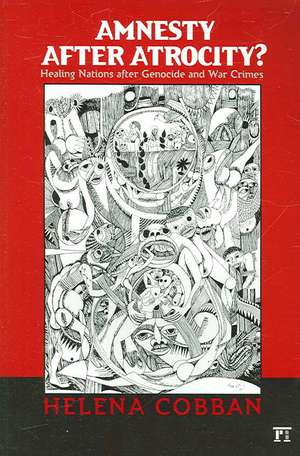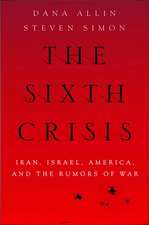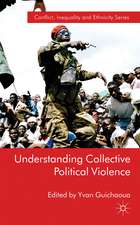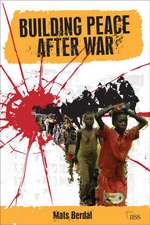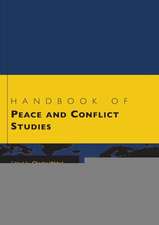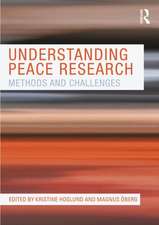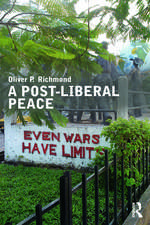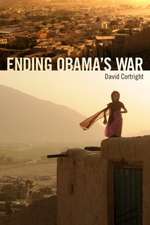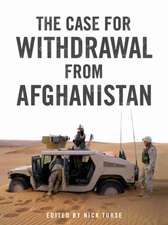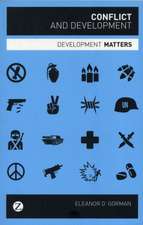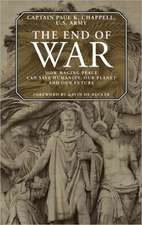Amnesty After Atrocity?: Healing Nations After Genocide and War Crimes
Autor Helena Cobbanen Limba Engleză Paperback – 15 mar 2007
| Toate formatele și edițiile | Preț | Express |
|---|---|---|
| Paperback (1) | 413.94 lei 6-8 săpt. | |
| Taylor & Francis – 15 mar 2007 | 413.94 lei 6-8 săpt. | |
| Hardback (1) | 1110.74 lei 6-8 săpt. | |
| Taylor & Francis – 15 oct 2006 | 1110.74 lei 6-8 săpt. |
Preț: 413.94 lei
Nou
Puncte Express: 621
Preț estimativ în valută:
79.21€ • 82.91$ • 65.93£
79.21€ • 82.91$ • 65.93£
Carte tipărită la comandă
Livrare economică 31 martie-14 aprilie
Preluare comenzi: 021 569.72.76
Specificații
ISBN-13: 9781594513176
ISBN-10: 1594513171
Pagini: 296
Dimensiuni: 156 x 234 x 20 mm
Greutate: 0.4 kg
Ediția:1
Editura: Taylor & Francis
Colecția Routledge
Locul publicării:Oxford, United Kingdom
ISBN-10: 1594513171
Pagini: 296
Dimensiuni: 156 x 234 x 20 mm
Greutate: 0.4 kg
Ediția:1
Editura: Taylor & Francis
Colecția Routledge
Locul publicării:Oxford, United Kingdom
Recenzii
"In this profoundly disturbing book, Helena Cobban confronts us inescapably with the way the Western world has closed its ears to the tragedy of Africa. There is a way to redeem ourselves, and that is the theme of much of Amnesty After Atrocity?"
—-Daniel Schorr, Senior News Analyst, National Public Radio
“In Amnesty after Atrocity? Healing Nations after Genocide and War Crimes, Helena Cobban presents a remarkable documentation and analysis of the debate between those who favor punitive justice, mostly Westerners, and those who lean toward healing, forgiveness and reconciliation, the dominant tendency among the Africans. While there is an obvious cultural dimension to this debate, Ms. Cobban's impressively sensitive and insightful discussion of the experiences of several countries demonstrates that these positions are bridgeable. The objective should be to promote justice, healing and reconciliation as all worthy principles. Amnesty after Atrocity? is an important and timely contribution that should merit the attention of all those concerned with response to the tragedies of genocide and war crimes around the world.”
—-Francis M. Deng, formerly Sudanese Ambassador to the United States, the Scandinavian countries and Canada, is currently a Distinguished Visiting Scholar at the John W. Kluge Center of the Library of Congress, and a Research Professor of International Politics, Law and Society at Johns Hopkins University's School of Advanced International Studies
"Helena Cobban makes a very important contribution to the growing debate over the wisdom of pursuing retribution versus reconciliation where mass violations of human rights have taken place. Her conclusions may not sit well with everyone engaged in this debate, but everyone should read this book to understand the experience of those countries that have gone through this process and that have informed her careful judgment."
—-Princeton N. Lyman, Council on Foreign Relations
“A powerful reminder that dealing with the legacy of wartime atrocities is not simply a matter of bringing perpetrators to justice. It also means overcoming the divisions within the society and healing the victims. International tribunals do not provide the entire answer.”
—-Marina Ottaway, Senior Associate, Democracy and Rule of Law Project, Carnegie Endowment for International Peace
“Helena Cobban is a veteran journalist who has covered transitional justice in many countries. Her views have always been marked by independence and a questioning of commonly accepted approaches. Her first person accounts make this book compelling reading.”
—-Richard J. Goldstone, former Chief Prosecutor of the UN tribunals for the former Yugoslavia and Rwanda and former Justice of the Constitutional Court of South Africa
“Helen Cobban is a gifted writer who brings the frontlines of violence and peacebuilding to life in research that is as moving as it is insightful. Her book is a courageous journey into the pressing problems and creative solutions facing nations struggling to move beyond war--an illuminating lesson for everyone whose country is affected by war today.”
—-Carolyn Nordstrom, Professor of Anthropology, University of Notre Dame
—-Daniel Schorr, Senior News Analyst, National Public Radio
“In Amnesty after Atrocity? Healing Nations after Genocide and War Crimes, Helena Cobban presents a remarkable documentation and analysis of the debate between those who favor punitive justice, mostly Westerners, and those who lean toward healing, forgiveness and reconciliation, the dominant tendency among the Africans. While there is an obvious cultural dimension to this debate, Ms. Cobban's impressively sensitive and insightful discussion of the experiences of several countries demonstrates that these positions are bridgeable. The objective should be to promote justice, healing and reconciliation as all worthy principles. Amnesty after Atrocity? is an important and timely contribution that should merit the attention of all those concerned with response to the tragedies of genocide and war crimes around the world.”
—-Francis M. Deng, formerly Sudanese Ambassador to the United States, the Scandinavian countries and Canada, is currently a Distinguished Visiting Scholar at the John W. Kluge Center of the Library of Congress, and a Research Professor of International Politics, Law and Society at Johns Hopkins University's School of Advanced International Studies
"Helena Cobban makes a very important contribution to the growing debate over the wisdom of pursuing retribution versus reconciliation where mass violations of human rights have taken place. Her conclusions may not sit well with everyone engaged in this debate, but everyone should read this book to understand the experience of those countries that have gone through this process and that have informed her careful judgment."
—-Princeton N. Lyman, Council on Foreign Relations
“A powerful reminder that dealing with the legacy of wartime atrocities is not simply a matter of bringing perpetrators to justice. It also means overcoming the divisions within the society and healing the victims. International tribunals do not provide the entire answer.”
—-Marina Ottaway, Senior Associate, Democracy and Rule of Law Project, Carnegie Endowment for International Peace
“Helena Cobban is a veteran journalist who has covered transitional justice in many countries. Her views have always been marked by independence and a questioning of commonly accepted approaches. Her first person accounts make this book compelling reading.”
—-Richard J. Goldstone, former Chief Prosecutor of the UN tribunals for the former Yugoslavia and Rwanda and former Justice of the Constitutional Court of South Africa
“Helen Cobban is a gifted writer who brings the frontlines of violence and peacebuilding to life in research that is as moving as it is insightful. Her book is a courageous journey into the pressing problems and creative solutions facing nations struggling to move beyond war--an illuminating lesson for everyone whose country is affected by war today.”
—-Carolyn Nordstrom, Professor of Anthropology, University of Notre Dame
Cuprins
Chapter 1 Atrocities, Conflicts, and Peacemaking; Chapter 2 Rwanda; Chapter 3 South Africa; Chapter 4 Mozambique; Chapter 5 Comparing Postconflict Justice in Rwanda, South Africa, and Mozambique; Chapter 6 Restoring Peacemaking, Revaluing History;
Descriere
Veteran journalist Helena Cobban examines the different ways of dealing with the aftermath of genocide and violence.
